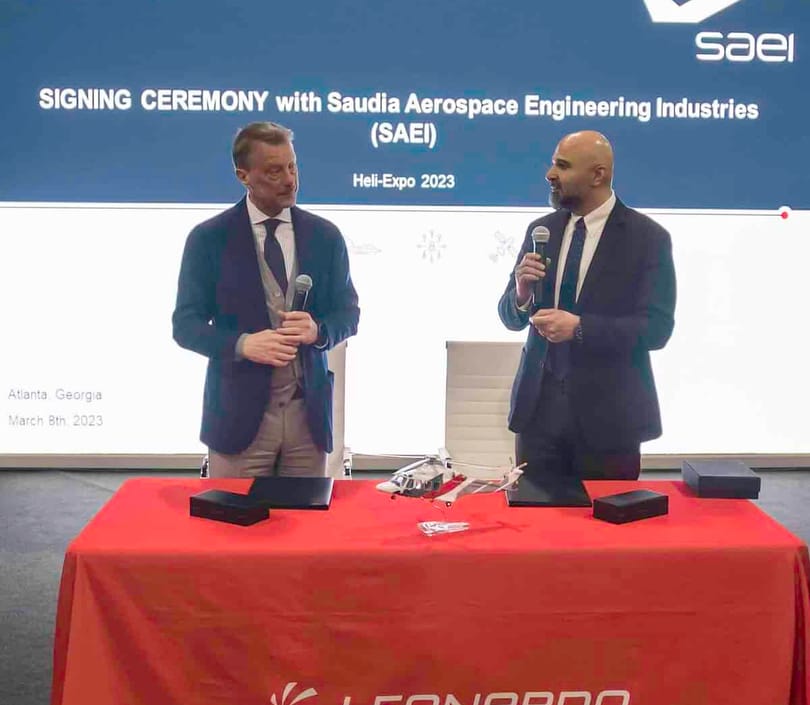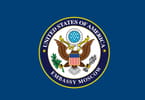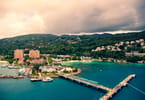An MOU signed at Heli-Expo Atlanta this week should play a critical role in supporting infrastructure projects to fulfill the Kingdom of Saudi Arabia’s Vision 2030.
Saudia Aerospace Engineering Industries (SAEI) is now an authorized service center of Leonardo Helicopters after SAEI’s CEO, Capt. Fahd Hamzh Cynndy, signed an agreement on March 8 with that Italian manufacturer of rotary-wing aircraft.
Countersigning was Leonardo Helicopters Managing Director Gian Piero Cutillo, who hosted Captain Cynndy at his company’s exhibit during the world’s premier helicopter trade show, Heli-Expo, in the U.S. city of Atlanta, Georgia.
“We share similar DNAs when it comes to ethics, integrity, standards, and a commitment to safety in aviation,” Captain Cynndy said after the signing, adding that he and Mr. Cutillo quickly had found “very common ground” when they began work toward the agreement in November 2021.
“We share the same integrity regarding the safety commitment and the commitment to technology and digitalization.”
Captain Cynndy
For his part, Cutillo said Saudia Aerospace Engineering Industries (SAEI) was the best choice of a service partner for his company. “We believe that SAEI is the right company,” he said, “and a competitive advantage for Leonardo.”
SAEI’s service center work will begin in a few weeks when it inducts a Kingdom-based Leonardo AW139 for scheduled inspections and related work into its state-of-the-art maintenance, repair, and overhaul (MRO) facility at King Abdul-Aziz Airport in Jeddah.
The 15-seat, twin-engine AW139 is among the world’s best-selling helicopters, with nearly 1,300 being flown today by more than 290 operators in over 80 countries in missions ranging from corporate, VIP transport to emergency medical services and search and rescue (SAR).
The Helicopter Company (THC), set up in 2018 under the Saudi Public Investment Fund (PIF), has been building its fleet of AW139s and other helicopters for several years.
In the last six months of 2022, the newly introduced Leonardo rotorcraft saved 570 lives in Search and Rescue missions in Saudi Arabia.
SAEI’s expansion into helicopter MRO services will be a key enabler in achieving the goals of the Kingdom’s 2030 economic and societal transformation strategy, Captain Cynndy said. “Vision 2030 has a lot of ambitions hinging on the success of the civil aviation sector.”
Launched in 2016, Vision 2030 aims to reduce the Kingdom’s dependence on oil, diversify its economy and develop its education system, health care, infrastructure, recreation opportunities, and tourism industry.
“We intend to provide better opportunities for partnerships with the private sector through the three pillars” of the strategy, His Royal Highness Prince Mohammed bin Salman bin Abdulaziz has said. Those pillars are the Kingdom’s position “as the heart of the Arab and Islamic worlds, our leading investment capabilities, and our strategic geographical position.”
His Royal Highness Prince Mohammed bin Salman bin Abdulaziz
Building better roads, rail lines, power and pipelines, and other infrastructure are typically projects in which helicopters play vital roles, as is the expansion of gold, phosphate, uranium, and other natural-resource mining envisioned in Vision 2030.
Helicopters also play a key role in developing new tourist destinations, and luxury resorts, enabling transporting guests – another element of the Kingdom’s vision.
Saudi Arabia’s national aviation policy fulfills Vision 2030 calls, partly for “enabling the national tourism strategy and strengthening the local aviation sector.”
The Kingdom’s Ministry of Transport and Logistics Service (which includes the country’s General Authority for Civil Aviation) aims to support Vision 2030 by developing transport that will make Saudi Arabia “a logistics center linking the three continents” and promoting “sustainable economic development and competitiveness.”
It aims to do that in part by helping make the Kingdom’s aviation sector “one of the most important sectors contributing to the domestic product,” achieving “the highest levels of safety worldwide” and encouraging “national companies to expand regionally and internationally.”
Captain Cynndy noted that Vision 2030 and the national aviation policy “have particular metrics that we have to execute on. Those metrics have been realized in the form of a helicopter segment” that is now developing its civil side.
“Four years ago, almost none of it existed,” he said. “Now, we’re talking 40-plus helicopters, soon to be in the 80s and maybe 100 or so. This is just the beginning.”
Saudia Aerospace Engineering Industries (SAEI) is the leading aviation technical solutions provider in the Kingdom of Saudi Arabia, the Middle East, and North African regions, backed by over 60 years of experience and more than 4,200 highly qualified and trained professional workers.
It holds approvals from the Kingdom’s General Authority for Civil Aviation (GACA), the U.S. Federal Aviation Administration, European Union Aviation Safety Agency, and several other regional and international authorities.
It offers extensive integrated MRO services to civil and military aircraft fixed-wing airplane owners and operators locally and abroad.
Its services include aircraft, engine, component maintenance, engineering, line maintenance, manufacturing, supply chain, and logistics.
“Making the jump over to rotary-wing aircraft and trying to onboard that critical knowledge for helicopters, in theory, looks easy,” Captain Cynndy said. “But in practice, it takes commitment and a rigorous process.”
He added that Leonardo “has always been committed to the Kingdom of Saudi Arabia, not just in delivering state-of-the-art machines but in growing the ecosystem as a whole and making sure the infrastructure is there to sustain growth going forward for the kingdom, within the kingdom and possibly the region.”
Like its predecessor companies, Agusta in Italy and Westland in the United Kingdom, the manufacturer built airplanes in the 20th century first decades and started making helicopters in the 1950s. Leonardo brought that corporate knowledge and the technical expertise, due diligence, and best practices to help SAEI progress through the tiers of developing helicopter MRO expertise.
“This is a generational excellence,” Captain Cynndy said. “Bringing that to the kingdom sustainably and permanently would only make our vision closer to meeting its strategic targets.”
“We needed to demonstrate what we are capable of doing to achieve Leonardo’s trust that we could maintain Leonardo’s helicopters as if they were maintained in Italy,” he said. “That took a year, but this is just the journey’s beginning.”
Cutillo praised the foundations of leadership and expertise from which SAEI started that journey.
“To have a center of excellence in maintenance is not something you can create overnight,” he said. “You’ve got to have something from which you can start,” like SAEI’s six-plus decades of fixed-wing MRO experience.
To build a new local MRO capability with real value-added activity, “you’ve got to have a reliable party from a competence point of view. We believe that the experience that SAEI has can facilitate this partnership.”
Captain Cynndy said the partnership will offer Leonardo helicopter operators a turnkey solution, “and that solution also happens to mesh perfectly with the Vision 2030 and the Kingdom’s national aviation strategy.”
Cutillo added that they also benefit from putting Leonardo and SAEI close to their customers. “Being close to the customer is key to having success and understanding what customers need to have their aircraft available and ready to fly. At the end of the story, they have got to fly.”
WHAT TO TAKE AWAY FROM THIS ARTICLE:
- It aims to do that in part by helping make the Kingdom's aviation sector “one of the most important sectors contributing to the domestic product,” achieving “the highest levels of safety worldwide” and encouraging “national companies to expand regionally and internationally.
- SAEI's service center work will begin in a few weeks when it inducts a Kingdom-based Leonardo AW139 for scheduled inspections and related work into its state-of-the-art maintenance, repair, and overhaul (MRO) facility at King Abdul-Aziz Airport in Jeddah.
- “We share similar DNAs when it comes to ethics, integrity, standards, and a commitment to safety in aviation,” Captain Cynndy said after the signing, adding that he and Mr.























